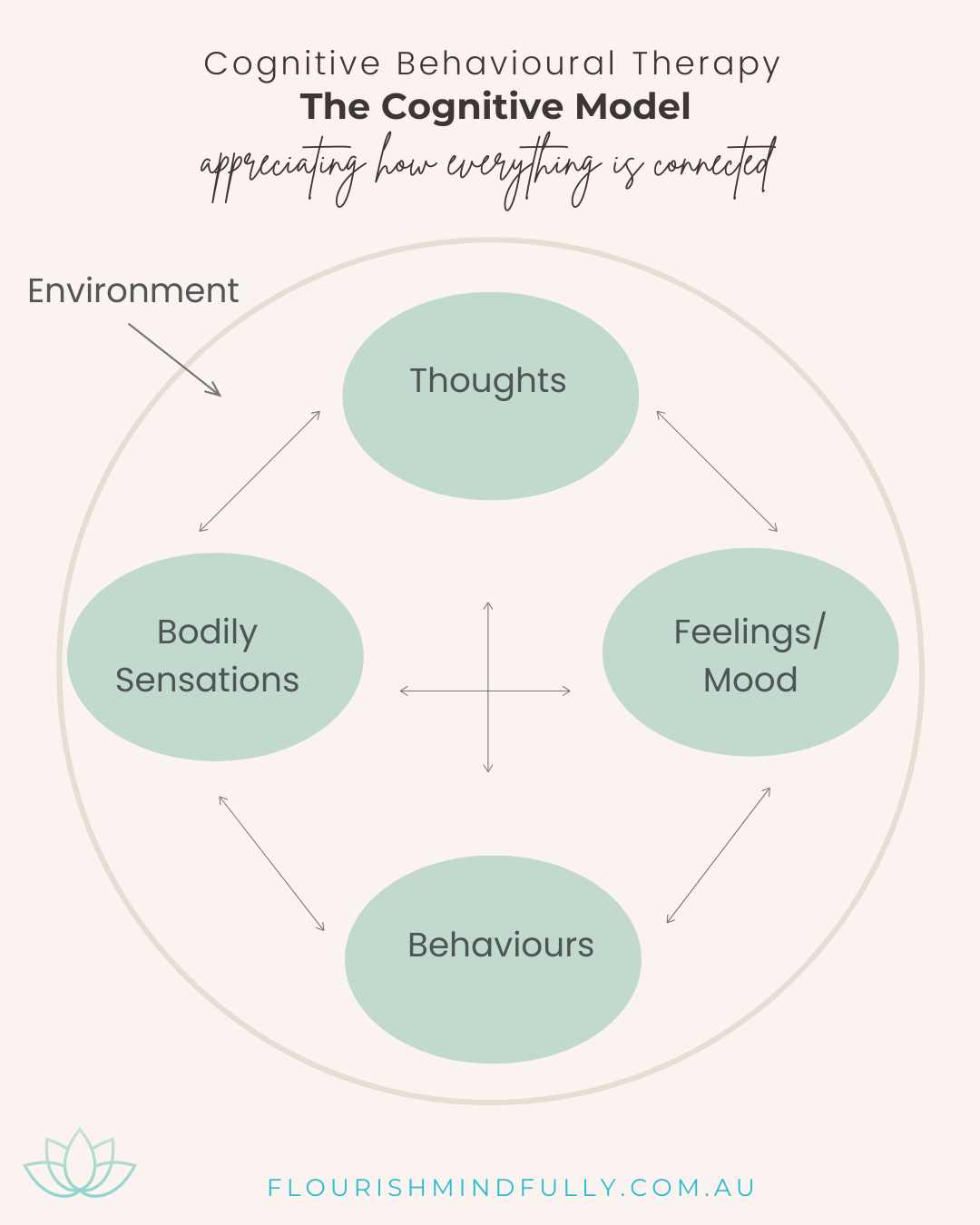Language Matters: How Self-Talk Shapes the Way You Feel and Live
Have you ever noticed the quiet stream of words running through your mind during the day?
Sometimes it sounds like a whisper: ’I should do this, I have to do that.’
Other times it may be louder: ’Why did I mess up again?’
These words you say to yourself matter. They’re not just background noise. They shape how you feel in your body, how you behave, and how you move through life.
Psychology describes this link between thoughts, feelings, and behaviours, all influencing one another, as the cognitive model. But you don’t need the theory to know this is true; you’ve felt the weight of the harsh inner critic. And I hope you’ve also felt the lightness of a different inner voice — the one cheering you on, helping you to stay the course.
Why Language Matters
Self-talk is a form of thinking — and our thoughts, feelings, and behaviours are all deeply connected - the Cognitive Model, in Psychology.
When a thought arises, it shapes how you feel.
How you feel influences what you do.
What you do then reinforces how you think.
It’s a cycle. The words you choose for yourself can either fuel feelings and behaviours of self-criticism, or through more helpful thoughts, cultivate feelings and behaviours that have flexibility, kindness, and intentionality.
Below are 3 different ways we talk to ourselves, and their impact.
1. From Pressure to Possibility
Words like ’should, must, need to, have to’ carry weight. They foster feelings of obligation and guilt.
Alternative language that promotes choice includes:
‘I could.’
‘I’d prefer.’
‘I choose to.’
Making the shift to the alternative language may seem small, but it is powerful. Notice how the body feels lighter when you move from pressure into possibility.
Practice: Say to yourself ’I should’ or ’I must,’ and notice how it feels, in your body – heavy? restrictive? tense? something else?
Now say to yourself, ’I could’ or ’I’d like to.’ Do you feel any difference? Do you notice a sense of possibility, or choice; maybe a shift from the weightiness of the ‘have to’ to a lighter ‘I’d prefer to’?
2. From Fixed to Flexible
When you say ’This is just how I am,’ another common self-talk phrase, it can feel like a fixed identity, with no room, or interest, to move.
To foster flexibility of mind, consider instead:
‘This is how I am just now.’
‘This is where I am today, and tomorrow can be different.’
‘This is one part of me, not all of me.’
These phrases are each reminders that nothing stays the same; we are always changing, evolving, and growing. They open the door for curiosity and compassion, rather than closing it with ‘This is just how I am’ full stop.
Practice: Pause for a moment to tune in to how these words to yourself feel, in your body, ‘This is just how I am’. Compared with, ’This is how I am just now’? Can you notice the space the latter creates, for other possibilities, or for change?
3. From Self-Criticism to Self-Compassion
The Self-Critic can emerge when things don’t go as you had planned or hoped, of you have made a mistake.
Self-criticism often sounds like:
‘I messed up, I’m hopeless.’
‘How could I have…?’
Compassionate self-talk, on the other hand, could sound like:
‘That didn’t go how I hoped, I’d prefer not to be feeling this way’
‘This moment is painful, but it doesn’t define me.’
‘Can I be kind to myself while I figure this out?’
‘Wow, that was tough. Let me take a moment to gather myself, and check in what I need just now, to support me through this’
Compassionate language doesn’t dismiss mistakes, rather it supports you in moving through them, and learning from them, with kindness rather than shame or despair.
Your Invitation
Can you see how the way you speak to yourself matters? That it shapes how you feel, how you behave, and ultimately, how you live your life, and how you show up with others.
Here are two practices to experiment with:
Notice your ‘shoulds’ and ‘have tos.’
Replace them with ‘coulds’ or ‘I’d prefer to…’ and see how it feels.When you catch a harsh inner voice, pause and ask:
’Would I say this to someone I love?’
If not, what words would I offer them instead?
It is not uncommon for us humans to speak to ourselves more harshly than we would to anyone else in our lives.
These small shifts in language can create profound shifts in how you experience your inner world, and your outer world, and your relationship with yourself.
If you find changing your self-talk to be challenging, please know you are not alone, and you don’t need to do the work by yourself. It can be more efficient working with a professional, and new insights often come when this style of change work happens.
Professional support can help you shift these well established patterns. Whether through counselling or coaching with me, or with another practitioner you feel comfortable with, reaching out is a step toward doing something for yourself, to make life more easeful or joyfilled.
One small shift in your language might just create a ripple of change 🍃




